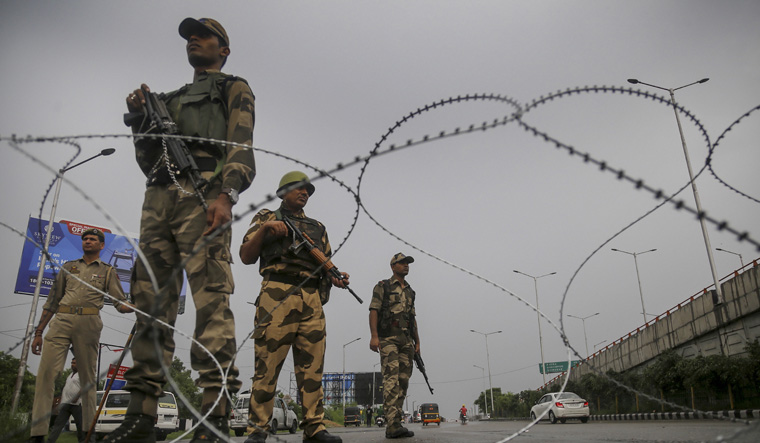 Paramilitary personnel stand guard during restrictions, in Jammu, Wednesday | PTI
Paramilitary personnel stand guard during restrictions, in Jammu, Wednesday | PTI
In the words of the Persian poet Amir Khusrau, Gar firdaus bar roo-e zameen ast, Hameen asto, hameen asto, hameen asto (If there is a paradise on earth, it is this, it is this, it is this). I grew up hearing that phrase over and over again from my grandfather. Yes, Kashmir did feel like paradise growing up. I have memories of riding horses in Pahalgam, skiing in Gulmarg, fishing for trout in Lidder Valley, swimming in the Dal lake, drinking ice-cold water from Cheshmashahi and countless more. I also remember Kashmir as a relatively crime-free place, where the police carried their trusted “lathis” as the standard issued weapon.
ALSO READ
- A new era has begun in Jammu, Kashmir and Ladakh: Modi
- Modi govt's legal manoeuvring on Article 370
- Congress veteran Karan Singh finds 'several positives' in Modi's Kashmir move
- Pak foreign office says Kashmir not India's internal matter
- Kartarpur Corridor work to continue; Samjhauta Express suspended
- Article 370: PM Modi to address nation at 8pm today
I remember riding my bicycle to my Catholic school, reciting the prayer, “Our Father in Heaven …” every morning. I counted Kashmiri Pandits, Sikhs, Christians and Muslims among my best friends. We celebrated Eid, Baisakhi, Shivratri and Christmas alike, I remember being angry at getting the part of “one of the wise men” every year for the Christmas play at school. Religion was never at the forefront. Yes, we were Muslims, Pandits, Christians and Sikhs but we identified first as Kashmiris. All of that ended in the winter of 1989.
It started with the famous Amar Singh Club (a prominent social club in Srinagar) being bombed. The next day, a police jeep was shot at by someone with an automatic weapon, which we learnt was the infamous AK-47. The J&K Police were completely in-equipped to deal with the situation. They had rifles from WW-II, which was no match against the fire-power of the AK-47. So, the Army had to be called in, and that changed the landscape of the Valley forever. The Jammu and Kashmir Liberation Front or JKLF had declared war on India and nothing short of independence from India would satisfy them.
I had read about the Israel-Palestine conflict, seen bombed buildings on television, and this was happening at my home, on the streets where I bicycled to school. Nothing would be the same again. Everything had changed overnight. Gun fights between the insurgents or “freedom fighters” and the Indian Army became a daily occurrence, curfew began to be imposed for days at a time. Schools and colleges were shut for months. Soon, whoever had the means sent their kids off to school outside the state.
Initially, the fight was for the independence of Kashmir from India, independence which included all Kashmiris. But, as time passed, the fight for independence turned into a fight against other religions. It was a jihad and anyone who was not a Muslim suddenly had no place in Kashmir. Overnight, thousands of Kashmiri Pandits were told to leave the valley or be killed. My closest friends had to pack up their lives in a suitcase and leave their homes in a matter of hours. Most have never returned. If you weren’t a Muslim, you weren’t welcome in this new Kashmir, and that is how the “freedom struggle” has raged on for 30 years now.
Growing up, I was taught that Islam was a religion of tolerance; we do not believe in violence, we celebrate life, we celebrate all religions, but that turned out to be just words. I saw neighbors turn against neighbors. I saw close friends preaching azaadi (freedom) and justifying the “freedom struggle” against India. This was somehow was a justification for all the wrongs that had been done in the rest of India against Muslims. I am not quite sure when the concept of an “Azaad Kashmir” (Independent Kashmir) evolved to Kashmir becoming part of Pakistan but that’s what the struggle seems to be about now.
What has 30 years of violence produced for Kashmir—a place frozen in time with a decrepit economy, decaying infrastructure, a place where the largest employer is the state government. There are almost no prospects for the thousands of graduates with degrees in medicine, engineering and business, in a place that has the largest concentration of security forces in the world. Kashmir is stuck in time and it will continue to remain there until the common man realises that the way to his prosperity is not by picking up a gun or strapping on a bomb, but by unshackling the chains of religion and demanding that the government pull the region out of economic isolation. For once, cast a vote for economic prosperity, band together to demand that the government create an environment for outside investment, give the next generation a chance at a brighter and better future. 30 years have gone by, and if nothing is done, another 30 will go by in the blink of an eye.
Zia Rehman is a business professional who was born and lived in Srinagar. He currently resides in the United States.
The opinions expressed in this article are those of the author's and do not purport to reflect those of THE WEEK





No comments:
Post a Comment